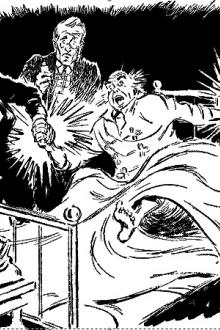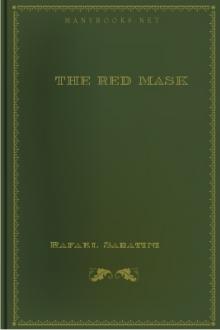The Face and the Mask - Robert Barr (comprehension books TXT) 📗

- Author: Robert Barr
Book online «The Face and the Mask - Robert Barr (comprehension books TXT) 📗». Author Robert Barr
If the police were astonished at the sight which met their gaze, their faces did not show it. But McCrasky had not such control over his features and he looked dumbfounded. The room was the same, undoubtedly, but there was not the vestige of a card to be seen. There were no tables, and even the bar had disappeared. The chairs were nicely arranged and most of them were occupied. At the further end of the room Pony Rowell stood on a platform or on a box or some elevation, and his pale, earnest face was lighted up with the enthusiasm of the public speaker. He was saying: "On the purity of the ballot, gentlemen, depends the very life of the republic. That every man should be permitted, without interference or intimidation, to cast his vote, and that every vote so cast should be honestly counted is, I take it, the desire of all who now listen to my words." (Great applause, during which Pony took a sip from a glass that may have contained water.)
The police had come in so quietly that no one, apparently, had noticed their entrance, except that good man Mellish, who hurried forward to welcome the intruders.
"Will you take a seat?" he asked. "We are having a little political talk from Mr. Rowell, sergeant."
"Rather an unusual hour, Mr. Mellish," said the sergeant grimly.
"It is a little late," admitted Mellish, as if the idea had not occurred to him before.
The police who had come in by the back entrance appeared at the other end of the room and it was evident that Rowell's oration had come to an untimely end. Pony looked grieved and hurt, but said nothing.
"We will have to search the premises, Mr. Mellish," said the sergeant.
Mellish gave them every assistance, but nothing was found.
As the four men walked back together to the Argus office, McCrasky was very indignant.
"We will expose the police to-morrow," he said. "They evidently gave Mellish the tip."
"I don't think so," said Thompson. "We will say nothing about it."
"You forget yourself, Mr. Thompson. It rests with me to say what shall go on the local page. Not with you."
"I don't forget myself," answered Thompson sadly; "I've just remembered myself. The Directors of the Argus appointed me local editor yesterday. Didn't they tell you about it? That's just like them. They forgot to mention the fact to Corbin that he had been superseded and the manager went off fishing after appointing Jonsey local editor, so that for a week we had two local editors, each one countermanding the orders of the other. It was an awful week. You remember it, Murren?" Murren's groan seemed to indicate that his recollection of the exciting time was not a pleasant memory.
"In case of doubt," murmured the religious editor, this time without removing his corn-cob, "obey the orders of the new man where the Argus is concerned. Thompson, old man, I'm wid you. When did the blow fall?"
"Yesterday afternoon," said Thompson, almost with a sob; "I'll be dismissed within a month, so I am rather sorry. I liked working on the Argus--as a reporter. I never looked for such ill luck as promotion. But we all have our troubles, haven't we, Mac?"
McCrasky did not answer. He is now connected with some paper in Texas.
STRIKING BACK.
George Streeter was in Paris, because he hoped and expected to meet Alfred Davison there. He knew that Davison was going to be in Paris for at least a fortnight, and he had a particular reason for wishing to come across him in the streets of that city rather than in the streets of London.
Streeter was a young author who had published several books, and who was getting along as well as could be expected, until suddenly he met a check. The check was only a check as far as his own self-esteem was concerned; for it did not in the least retard the sale of his latest book, but rather appeared to increase it. The check was unexpected, for where he had looked for a caress, he received a blow. The blow was so well placed, and so vigorous, that at first it stunned him. Then he became unreasonably angry. He resolved to strike back.
The review of his book in the Argus was vigorously severe, and perhaps what maddened him more than anything else was the fact that, in spite of his self-esteem he realized the truth of the criticism. If his books had been less successful, or if he had been newer as an author, he might possibly have set himself out to profit by the keen thrusts given him by the Argus. He might have remembered that although Tennyson struck back at Christopher North, calling him rusty, crusty, and musty, yet the poet eliminated from later editions all blemishes which musty Christopher had pointed out.
Streeter resolved to strike back with something more tangible than a sarcastic verse. He quite admitted, even to himself, that a critic had every right to criticise--that was what he was for--but he claimed that a man who pretended to be an author's friend and who praised his books to his face, had no right to go behind his back and pen a criticism so scathing as that which appeared in the Argus: for Streeter knew that Alfred Davison had written the criticism in the Argus, and Davison had posed as his friend; and had pretended as well, that he had a great admiration for Streeter's books.
As Streeter walked down the Boulevard des Italians, he saw, seated in front of a cafe, the man whom he hoped to meet: and furthermore, he was pleased to see that the man had a friend with him. The recognition of author and critic was mutual.
"Hallo, Streeter," cried Davison; "when did you come over?"
"I left London yesterday," answered Streeter.
"Then sit down and have something with us," said Davison, cordially. "Streeter, this is my friend Harmon. He is an exile and a resident in Paris, and, consequently, likes to meet his countrymen."
"In that case," said Streeter, "he is probably well acquainted with the customs of the place?"
"Rather!" returned Davison; "he has become so much of a Frenchman--he has been so contaminated, if I may put it that way--that I believe quite recently he was either principal or second in a duel. By the way, which was it, Harmon?"
"Merely a second," answered the other.
"I don't believe in duelling myself," continued Davison: "it seems to me an idiotic custom, and so futile."
"I don't agree with you," replied Streeter, curtly; "there is no reason why a duel should be futile, and there seem to be many reasons why a duel might be fought. There are many things, worse than crimes, which exist in all countries, and for which there is no remedy except calling a man out; misdemeanors, if I may so term them, that the law takes no cognisance of; treachery, for instance;--a person pretending to be a man's friend, and then the first chance he gets, stabbing him in the back."
Harmon nodded his approval of these sentiments, while Davison said jauntily:
"Oh, I don't know about that! It seems to me these things, which I suppose undoubtedly exist, should not be made important by taking much notice of them. What will you have to drink, Streeter?"
"Bring me a liqueur of brandy," said Streeter to the garcon who stood ready to take the order.
When the waiter returned with a small glass, into which he poured the brandy with the deftness of a Frenchman, filling it so that not a drop more could be added, and yet without allowing the glass to overflow, Streeter pulled out his purse.
"No, no!" cried Davison; "you are not going to pay for this--you are drinking with me."
"I pay for my own drinks," said Streeter, surlily.
"Not when I invite you to drink with me," protested the critic. "I pay for this brandy."
"Very well, take it, then!" said Streeter, picking up the little glass and dashing the contents in the face of Davison.
Davison took out his handkerchief.
"What the devil do you mean by that, Streeter?" he asked, as the color mounted to his brow.
Streeter took out his card and pencilled a word or two on the pasteboard.
"There," he said, "is my Paris address. If you do not know what I mean by that, ask your friend here; he will inform you."
And with that the novelist arose, bowed to the two, and departed.
When he returned to his hotel, after a stroll along the brilliantly- lighted Boulevards, he found waiting for him Mr. Harmon and a Frenchman.
"I had no idea you would come so soon," said Streeter, "otherwise I would not have kept you waiting."
"It does not matter," replied Harmon; "we have not waited long. Affairs of this kind require prompt action. An insult lasts but twenty-four hours, and my friend and principal has no desire to put you to the inconvenience of repeating your action of this evening. We are taking it for granted that you have a friend prepared to act for you; for your conduct appeared to be premeditated."
"You are quite right," answered Streeter; "I have two friends to whom I shall be pleased to introduce you. Come this way, if you will be so kind."
The preliminaries were speedily arranged, and the meeting was to take place next morning at daylight, with pistols.
Now that everything was settled, the prospect did not look quite so pleasant to Streeter as it had done when he left London. Davison had asked for no explanation; but that, of course, could be accounted for, because this critical sneak must be well aware of the reason for the insult. Still, Streeter had rather expected that he would perhaps have simulated ignorance, and on receiving enlightenment might have avoided a meeting to apologizing.
Anyhow, Streeter resolved to make a night of it. He left his friends to arrange for a carriage, and see to all that was necessary, while he donned his war-paint and departed for a gathering to which he had been invited, and where he was to meet many of his countrymen and countrywomen, in a fashionable part of Paris.
His hostess appeared to be overjoyed at seeing him.
"You are so late," she said, "that I was afraid something had occurred to keep you from coming altogether."
"Nothing could have prevented me from coming," said Streeter, gallantly, "where Mrs. Woodford is hostess!"
"Oh, that is very nice of you, Mr. Streeter!" answered the lady; "but I must not stand here talking with you, for I have promised to introduce you to Miss Neville, who wishes very much to meet you. She is a great admirer of yours, and has read all your books."
"There are not very many of them," said Streeter, with a laugh; "and such as they are, I hope Miss Neville thinks more of them than I do myself."
"Oh, we all know how modest authors are!" replied his hostess, leading him away to be introduced.
Miss Neville was young and pretty, and she was evidently pleased to meet the rising young author.
"I have long wanted to see you," she said, "to have a talk with you about your books."
"You are very kind," said Streeter, "but perhaps we might choose something more profitable to talk about?"
"I am not so sure of that. Doubtless you have





Comments (0)